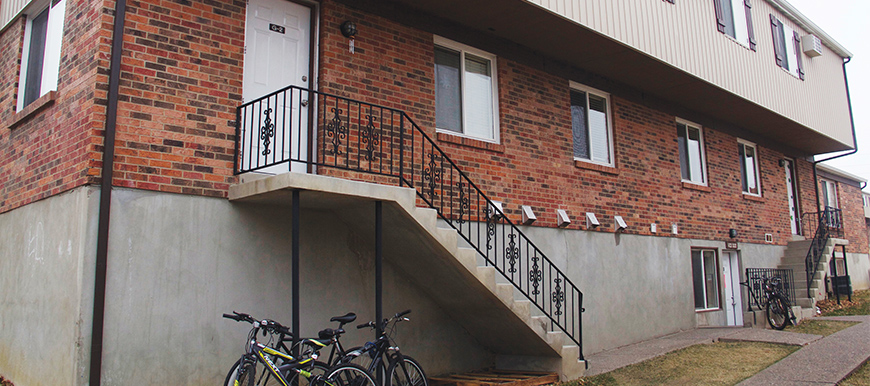Most Utahns unknowledgeable of fair housing law
Under the Utah Fair Housing Law, housing discrimination based on race, color, religion, national origin, sex, disability, familial status and source of income is illegal.
But a research project by a Utah State University class of junior-level social work majors has found that most Utahns are unaware of what is protected under the law.
Jessica Lucero, assistant professor of social work at Utah State University, and her community practice class are working with the Moab regional campus collecting data about the public knowledge and attitudes toward Utah’s Fair Housing law by canvassing select neighborhoods, working with community and religious outreach programs and utilizing social media.
“It seems to me that there’s a pretty low level of public knowledge of who the fair housing law protects,” Lucero said.
More than 700 people have responded the the survey. Although the results are preliminary, as surveys will close next week, Lucero said some are coming back incomplete due to respondents’ unfamiliarity of what is protected under the law.
According to the National Fair Housing Alliance, disability discrimination occurs more frequently than other protected class discrimination. The same is true in Utah.
“The two most discriminated-against categories in the state of Utah are single women with children and individuals with disabilities,” Lucero said.
To ensure that realtors and renters are obeying the law, the U.S. Department of Housing and Urban Development will send matched pairs of individuals to apply for housing. The pair will have the same qualifications and application, but one will be white and the other a minority.
“Every year we fail as a country in discrimination (by) significantly choosing the white individual to rent to,” Lucero said.
Jen Evers, assistant professor of social work who teaches the distance campus course based in Moab, said preliminary findings suggest that most Moab residents are not aware of the “purpose or scope” of the law.
Evers said Moab has unique housing issues and, although she can’t speak to the types of discrimination that exist, it is in line with state statistics.
“Housing is an issue in Moab. … As a tourist destination, we have a number of seasonal workers who need temporary housing as well as a lot of second homes in Moab, which drive up the cost of housing overall,” Evers said in an email to The Utah Statesman. “It’s an unfortunate combination that results in high rents and high purchase prices, which impacts all residents.”
Systematic housing discrimination, which led to social segregation, was legal in the U.S. until the federal Fair Housing Act of 1968. Lucero, who studies how residents of certain neighborhoods are at an advantage or disadvantage when accessing resources, said “there’s still a lot of work to be done.”
“There’s this really long and awful history of discrimination that was really explicit in the housing market, especially pre-fair housing law … where entire neighborhoods were red-lined or considered undesirable because they had a concentrated black population … so property values would crash and nobody wanted to buy there,” she said.
Now, legislation has been introduced to Utah lawmakers that would add additional protections in both housing and employment. SB0100, sponsored by Sen. Stephen Urquhart (R-Utah), would include sexual orientation and gender identity as prohibited bases for discriminatory housing and employment practices.
After The Church of Jesus Christ of Latter-day Saints publicly announced their support of the non-discrimination legislation, Lucero added a question to the survey to gauge the public’s response to such legislation.
“So far there has been support from the general public,” she said.
Bret Nielson, a junior majoring in social work who is participating in the research project, said he feels that the LDS Church’s support of the legislation likely resonates better with the LDS community than the LGBTQ community, but it’s a step in the right direction.
“The Church has such a strong hold on our community,” he said. “I think it’s definitely bringing light (to this issue).”
Nielson said, pending legislation aside, it’s important for students to be aware of their protections under the Utah Fair Housing Law.
“We don’t have a super-higher diversity rate here, but we do have diversity, especially on campus,” he said. “We’re making social relationships with diverse communities … and once those friends are discriminated against, we might want to help them out.”
Jill Jensen, a junior majoring in social work and research participant, said it’s important to be aware of housing protections because “finding a place to live is one of your basic needs.”
“Whether it be a simple or time-consuming process for a person, most people go through the process of renting an apartment,” Evers wrote in an email to The Utah Statesman. “Knowing the logistics of the fair housing law can help a property manager better serve their tenants more ethically and lawfully as well as the tenants and/or buyers being able to gauge if they are being treated fairly when renting and/or purchasing a place to live.”
— manda.perkins@hotmail.com
Twitter: @perkins_manda

